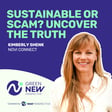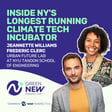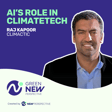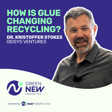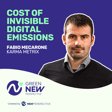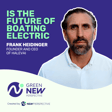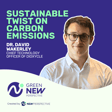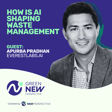
Purpose, Impact, and Building a Business
Handprint offers a platform that connects companies with impactful projects, allowing them to make a tangible difference in mitigating environmental challenges.
🌱 Handprint, a climate tech company, was co-founded in 2019 with the aim of regeneration and making a positive impact on the environment.
🌍 Their focus on using satellite images and blockchain technology for remote sensing and financial transparency in mangrove restoration and conservation projects highlights the potential of innovative solutions in environmental preservation.
🌱 Pursuing aggressive regeneration of natural ecosystems can create positive feedback loops that have unforeseen and surprising positive effects on the overall evolution of the planet's ecosystem.
🌊 Carbon sequestration can happen more effectively in the ocean through the growth of kelp, which absorbs carbon faster and can be cultivated in underwater farms.
🌍 There is a wealth of talent, knowledge, and ideas in the field of climatech, making it an exciting area with endless possibilities for innovation.
🐋 Whales play a crucial role in fighting climate change by absorbing carbon in their bones and moving Krill, the primary source of carbon absorption in the oceans, creating a positive cycle.
🔄 Climate change will force us to change the way we organize human life, while the biodiversity crisis fundamentally challenges the fact that we are alive.
🌍 There is no economic growth without a planet, as we can't have economic growth in a world where there is no clean air or where everyone is sick due to air pollution.
Business and Sustainability
🤝 Entrepreneurs, educators, and everyone should remain cautiously optimistic and work together to make a positive impact on the world.
🌍 Human ingenuity can work with nature to improve our chances of a long and healthy life on this planet for future generations.
🌍 SUSTAINABILITY PODCAST CREATED BY NEW PERSPECTIVE
========================
This podcast is proudly sponsored by New Perspective Marketing, a dynamic growth marketing agency in Boston, MA, celebrating 20 years in business. We help sustainably focused B2B organizations grow their brands and scale up revenue. If you or your organization is looking to grow, visit npws.com for more info.
🎧 SUBSCRIBE TO OUR PODCAST
===========================
- Spotify: https://bit.ly/3PSWIyI
- Apple Podcasts: https://bit.ly/3RvlHte
- Youtube: https://bit.ly/3RDzkXg
- Google Podcasts: http://bit.ly/465gjS5
- Deezer: https://bit.ly/3PvQaof
- Amazon Music: https://bit.ly/3PQlijS
- Zencastr: https://bit.ly/48xt75s
💬 FOLLOW US ON SOCIAL MEDIA
============================
- Instagram: https://www.instagram.com/greennewperspective/
- Twitter: https://twitter.com/gnperspective
- Facebook: https://www.facebook.com/greennewperspective
- LinkedIn: https://www.linkedin.com/showcase/greennewperspective/
- TikTok: https://www.tiktok.com/@greennewperspective
- Threads: https://www.threads.net/@greennewperspective
#sustainabilitypodcast #cleanenergy #greennewperspective #sustainability #cleanenergy #podcast #cleantech
